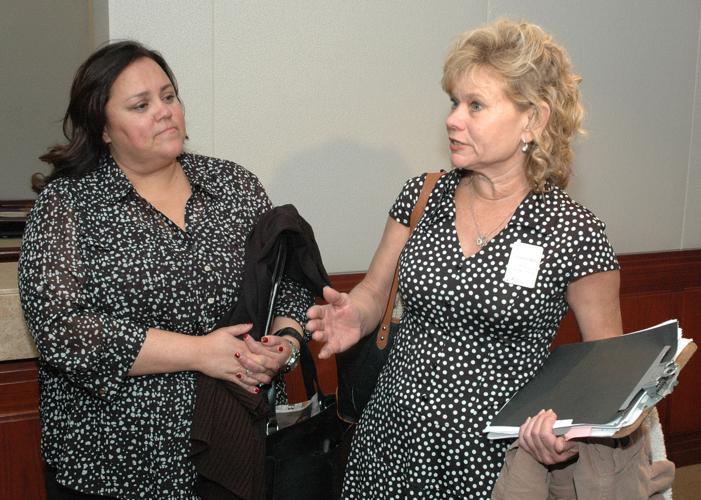The red mark left by this slap is not fading.
It’s been five days since Gov. Doug Ducey signed the bill expanding private-school vouchers to thousands more Arizona students.
Among public-school teachers and families, the pain remains. Frequent repetition of the mantra “school choice” is not soothing.
The last six Arizona teachers of the year, all those chosen from 2012 through 2017, signed a letter to the governor Monday that says, among other things:
“There is a teacher shortage of crisis proportions in this state. There were 2,000 unfilled positions, four weeks into this school year. Funneling public money into private hands with a total lack of oversight will only exacerbate that crisis; we have the third highest class sizes in the nation, and the voucher bill will also exacerbate that; we are funded at 49th in the nation, and the voucher bill will ensure that we remain near the bottom for the foreseeable future because more resources will be drained from public schools.”
Then comes the kicker: “However, we already rank #1 in school choice. Is there a correlation between the above statistics and this one?”
In other words, they argue, the pursuit of multiplying niche “choices” is degrading the overall school system. As Rep. Randy Friese, the Tucson Democrat, explained it, this program would take either $4,500 (if the student goes to a district school) or $6,300 (if the student goes to a charter school) per student from the student’s school and put it toward the family’s private-education expenses.
What really hurts these teachers is that they supported Ducey’s Prop. 123 last year, the initiative that allowed the government to tap the state land trust to help settle the lawsuit over school funding. It won by 51 percent to 49 percent. Without the teachers’ support, Ducey would have suffered a humiliating defeat.
And this is their reward?
“It was a tough haul to get that across the finish line,” 2016 teacher of the year Christine Marsh told me Tuesday. “To turn around this year to propose and then sign voucher bills, it’s inappropriate. If we need money for schools, which we do as evidenced by Governor Ducey working hard for Prop. 123, then we shouldn’t be draining more money out for voucher bills.”
Worse: We know this is just the next step of many, until Empowerment Scholarship Accounts, as these vouchers are known, become the monster that eats the state’s public-school budget.
We could have known that from experience. The Legislature first approved vouchers for children with special needs in 2011. Then children of parents on active military duty, foster children, children in failing schools and children on Indian reservations were added. Finally, this year, Sen. Debbie Lesko, R-Peoria, proposed vouchers for all.
Putting caps on enrollment in the program was the only way to get it through the Legislature and past skeptical Democrats and Republicans. Unfortunately, a few of those Republicans were also gullible, as the Goldwater Institute quickly made clear upon the passage of the bill last week.
Darcy Olsen, Goldwater’s CEO, shocked the handful of legislators who pretended this wasn’t the plan all along when she said in an email Thursday, “There is a cap at 5,000 new kids per year; we will get it lifted.”
Of course this was the plan all along. The bill passed each house of the Legislature by just one vote, so any one legislator voting in favor could have recognized the fallacy of the caps and killed it. But they chose not to.
There are also problems with the accountability of the measure. The Arizona Republic found the data on ESAs in a messy state when it made a records request to the Arizona Department of Education. This is how Rep. Regina Cobb, a Kingman Republican who switched to a yes vote on the measure at the last minute, responded to the state of the data in the Republic’s story.
“We don’t know where it’s (the money) going to. We have nothing. How do we make decisions as lawmakers, as far as funding a program, when we don’t even know if it’s working?”
She said that after casting a deciding vote in favor. That’s indefensible.
(It should be noted that Superintendent of Public Instruction Diane Douglas disputed the Republic’s claims about the inadequacy of the data. In a poor imitation of a well-known American politician, she called it “fake news” from a “failing news organization.”)
Cobb’s was one of several votes that flipped as a result of Ducey’s last-minute pressure to pass the bill. Why he suddenly made this vouchers bill a priority, after months of ignoring it, remains a mystery, although a spokesman for Ducey, Patrick Ptak, tells me the governor only made the push after last week’s amendment capping enrollment “added more transparency, accountability and fiscal responsibility.”
“He’s stated he will not entertain any changes to the program until we see how it works,” Ptak added.
But perhaps Ducey’s action is also explained by the reaction he got. Not from Arizona, but from national politicos.
Jeb Bush, Grover Norquist and Education Secretary Betsy DeVos were among the national political figures who tweeted their congratulations to Ducey. The Wall Street Journal editorial board published a piece praising the new law, which Ducey’s staff sent out.
Undoubtedly, the big-money donors in the Koch and Mercer networks, who want to dismantle the public-education system, took notice and were pleased. That could pay dividends in Ducey’s future political endeavors.
But back here at home, this swipe at the schools still stings. It hurts like only a betrayal can hurt.





